July is lotus flower season here in Beijing. Parks like the Old Summer Palace have lakes full of the huge leaves (some two feet across) and lovely flowers. Here are a few shots I took last weekend.
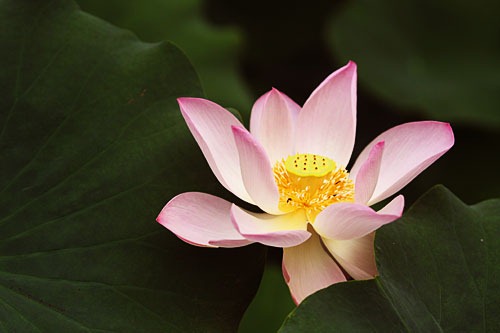
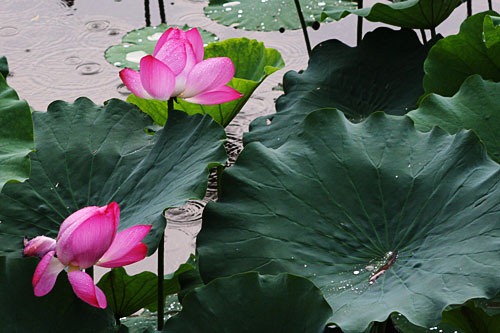
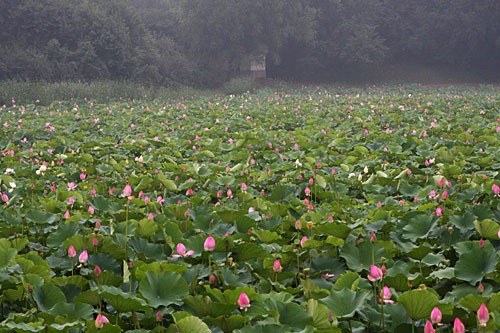
Random observations about food, gear, and other silliness by Tony Chor.
July is lotus flower season here in Beijing. Parks like the Old Summer Palace have lakes full of the huge leaves (some two feet across) and lovely flowers. Here are a few shots I took last weekend.



During my visit last Saturday to Ditan Park, one of the coolest martial arts I saw was shuai jiao. This is a type of Chinese wrestling. Based on my observations, a wrestler scores by making his opponent fall; no need to pin.
There was a wrestling ring raked into the dirt. On one side of the arena there was a table set up with the guys who were clearly the elders of the Ditan Park shuai jiao scene. 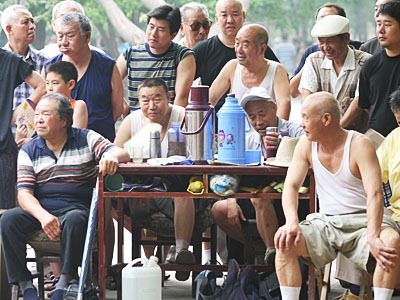
They kept laughing, yelling advice, and shaking their heads during the matches. This guy in particular was clearly the head dude. After many of the falls, he would jump into the ring and show one of the wrestlers how to fix some mistake he had just made. 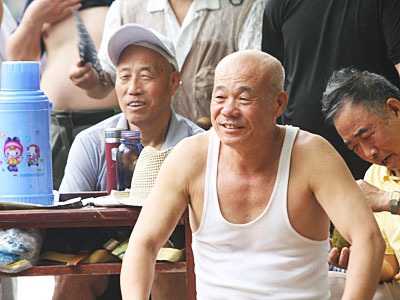
There were a few rounds, starting with the beginners. By the mid round the wrestlers had a little more swagger and were clearly better, moving faster and having better technique. 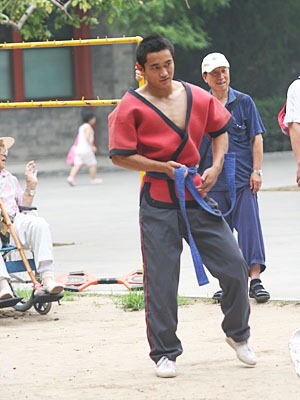
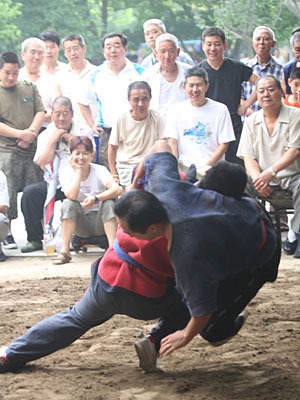
The highlight, though, came when the local champ (in red below) arrived. (The whole match seemed to be waiting for him to show up.) His opponent was no slouch, having been Beijing's representative in the national shuai jiao competition. 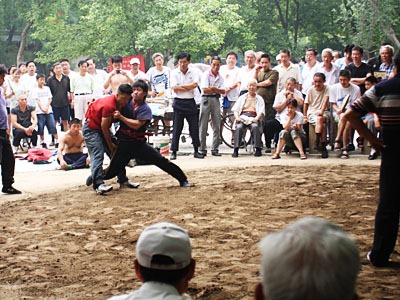
Of course, this being China, the champ interrupted the match to receive a cellphone call. 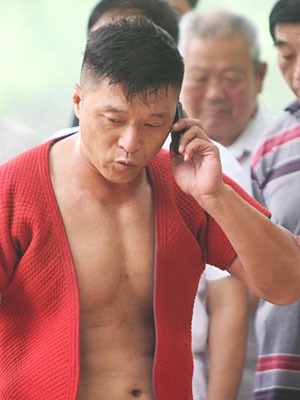
After his call, he put down his phone and proceed to kick the other dude's butt. He launched himself at the smaller guy and just flattened him. 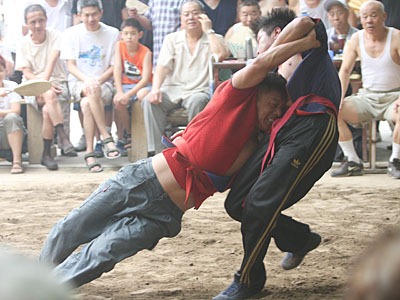
It was a very friendly atmosphere with lots of smiling and laughing between the contestants and coaches. They clearly were having fun and respected one another. There didn't seem to be any of the real hostility than can come with fighting sports. The large crowd seemed to enjoy it too. I did.
During my visit to Ditan Park last Saturday morning, my friend Kevin and I saw Beijingers practicing a wide range of martial arts styles. It was especially great to have Kevin explaining things to me; he's studied taiji (tai chi) for over ten years and was well versed in a lot of the different styles.
Some people were in the park practicing on their own. I couldn't stop watching this woman. Even though she is clearly older, she was absolutely fantastic. She had deep poses and had rock solid balance. I only wish I had been standing two feet to the right when I took this shot so the tree wasn't in the way. 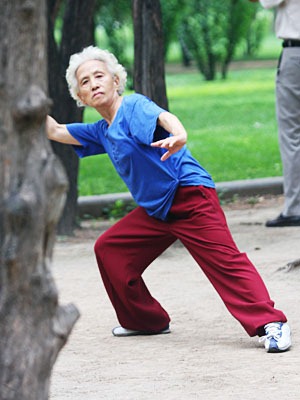
There were people practicing with weapons too, like these spear and sword guys. 
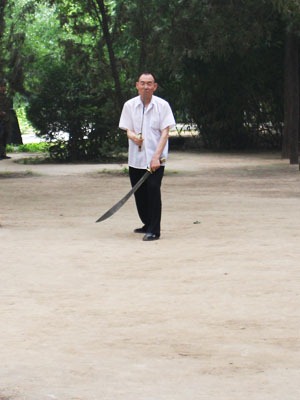
Others practiced with schools. During the week the schools practice in buildings, but during the weekends they come out to the parks. They apparently have their territory staked out. They indicate their school with banners they hang out. 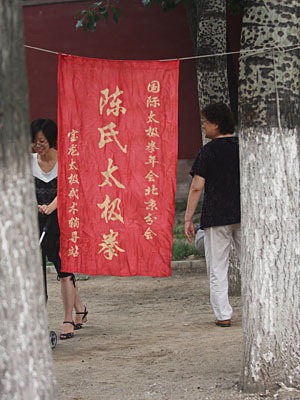
You can really see the difference in some of the forms. This is a northern style that emphasizes straight line attacks. They even practice along straight paths. 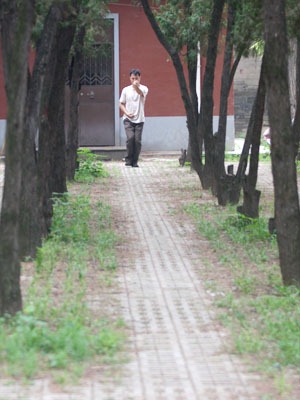
By contrast this guy is practicing on a ring of bricks. He stepped brick to brick as he practiced his forms. 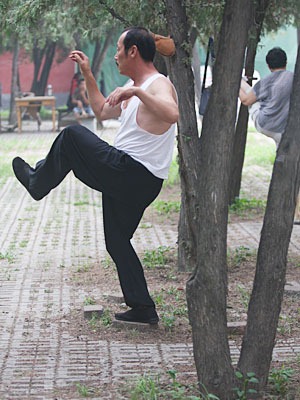
There was a guy practicing bagua over and over again, forming a circle in the dirt. I'm only sorry I didn't get a photo of the dude too. 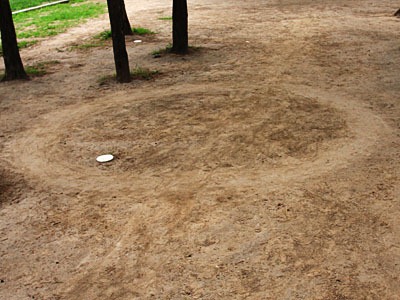
There were some beginners too. This is a well-known taiqi master working with a set of beginners. 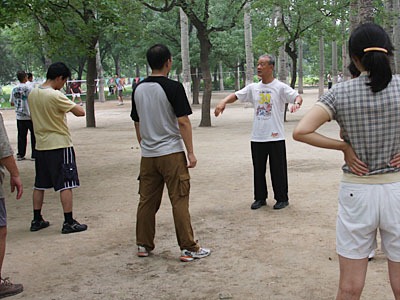
Unlike martial arts classes in the US, there were no fancy uniforms or belts. People were practicing in leather shoes, sneakers, jeans, shorts, whatever. It was really cool to see this all in one place. I'll have to find a class and come out.
On weekends, Beijingers flood into local parks to hang out and partake in all manner of activities -- martial arts, dancing, chess, opera, you name it. Last Saturday, my friend and colleague Kevin took me to a big park in the middle of Beijing, Ditan Park, to see the action.
Ditan is especially known for their martial arts, but there's lot more going on. Here are a few of of the non-martial arts activities. I'll post some martial arts photos next.
There were a bunch of people practicing Chinese calligraphy with 2.5 foot long brushes dipped in water. They'd use these write on the ground. There's something a little sad about the beautiful calligraphy fading into nothingness as the water dries. 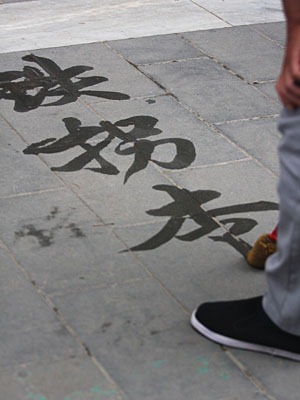
There were a lot of dancers -- from lines of women doing traditional Chinese dances to ballroom dancers like the folks below learning tango. (The couple in the middle were the instructors.) 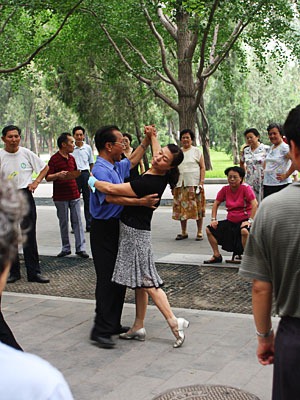
There were folks playing different sports like badminton (which is hardcore in China). These guys were playing menqiu or gateball, a simplified version of croquet. 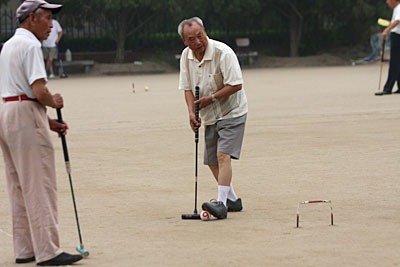
Not everything was old or classically Chinese. There were kids inventing the new China too.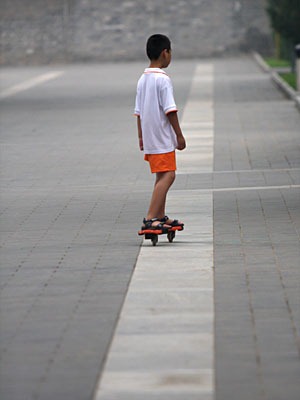
[2009-07-18 Added missing photo and alt tags.]
I take a lot of photos and try to help pose my subjects once in a while. Here's a good article and video with simple tips on how to look better in photos.
As you probably know, there are no fortune cookies after meals in restaurants in China; those are definitely an American innovation. However, there are lots of enigmatic expressions posted everywhere. Here are a few on big billboards near our house, advertising our villa district (neighborhood).
Note, they're no better in Chinese.
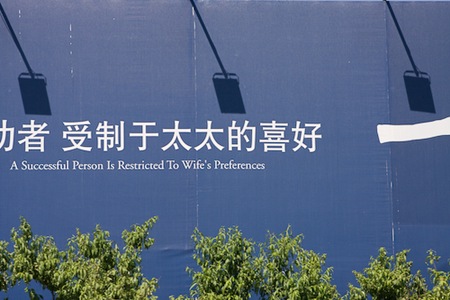
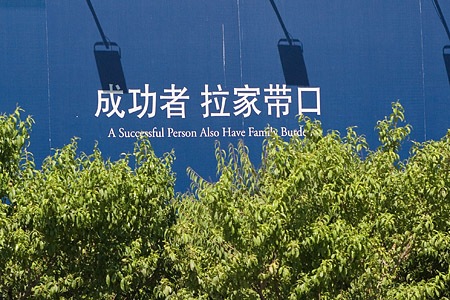
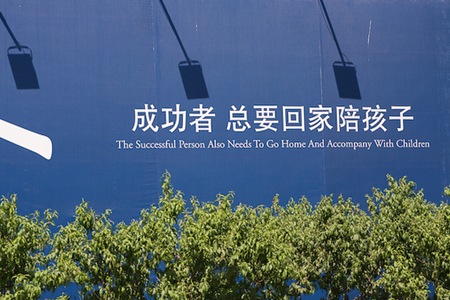
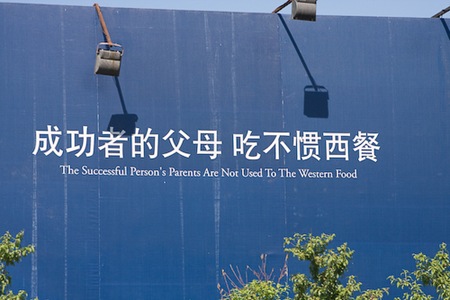
Based on these, I'm feeling pretty successful...
I saw these slabs of marble at a local market and got very hungry.
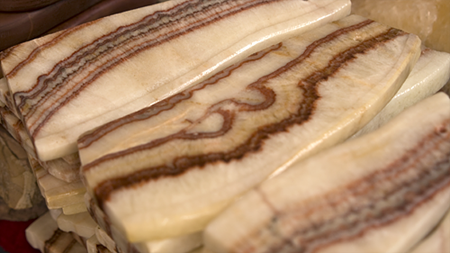
Last weekend, we took advantage of the boys' short spring break (two days off school -- shorter than normal this year because of the late start due after the Olympics) to take a quick jaunt down to Sanya, a city on the south coast of Hainan Island. Hainan is on the south coast of China in the South China Sea near Vietnam; it's often referred to as the "Hawaii of China." It's a popular resort destination for Chinese and expats, plus it's apparently a big draw for visitors from Taiwan, Japan, and Korea. More interestingly, it's a huge favorite for Russian tourists. On our drive from the airport, we saw a lot of signs with Russian on them.
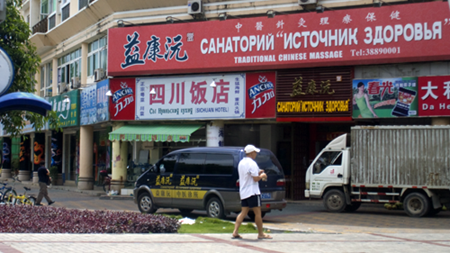
Contrary to my normal vacation mode where I want to see a lot things at our destination, this time we just wanted to sit around, soak up the warmth, and relax. To that end, we chose to stay at the Banyan Tree Resort in Sanya. The resort is away from the bustle of the more popular hotel areas, in a quiet section on Luhuitou Bay. We spent a lot of our time in and around the private pool in our two bedroom villa, going to the beach to play in the sand and warm water in the mornings when it was a bit cooler. The boys thought the midnight swims were especially cool.
(This is a Photosynth view of our villa. It's a composite image of a few hundred photos. You may need to install Photosynth first. BTW, Photosynth is a super cool technology by the big brain guys at Microsoft Live Labs. Worth checking out.)
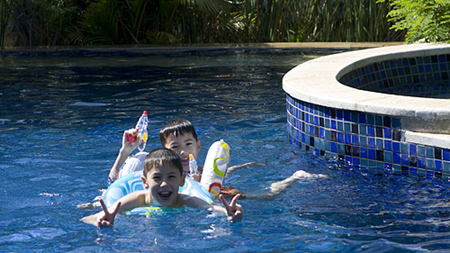
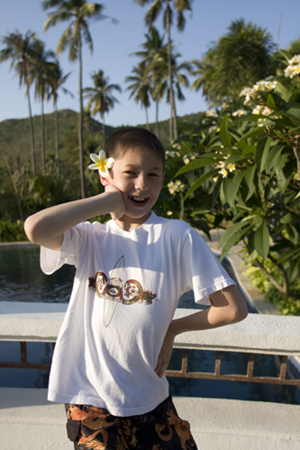
I managed to sneak out to Luhuitou Golf Club for my first round in eighteen months. It turns out that not playing for a while doesn't help your game. Fortunately, I was playing alone save for my caddie, who was polite enough not to laugh, and the course was impeccably maintained with perfect greens (not that I could make a putt to save my life.)
The facilities were undeniably lovely and the service was very good (particularly by Chinese standards). The only real downer (and probably the thing that would encourage us to to try someplace else next time) was the food. It was very inconsistent, ranging from great to fair, and the menu was pretty limited. By the end of our fourth day, we were pretty bored with the selection. (Although I did have a pretty good Hainan Chicken Rice - always good to try a dish in the place of its origin.)
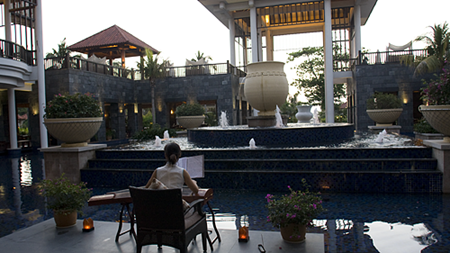
Still, it was great to get away from the dusty grey and brown air and ground of Beijing for warm, humid, clean air and lush tropical environs of Sanya. We all had a very enjoyable and relaxing time.
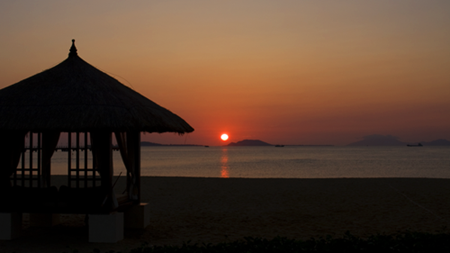
This is a picture of the gas station next to my office. Michelle pointed out the "fire equipment" at the station: three shovels and two buckets. I'm not sure how useful those shovels and buckets will be if that tanker truck goes up.
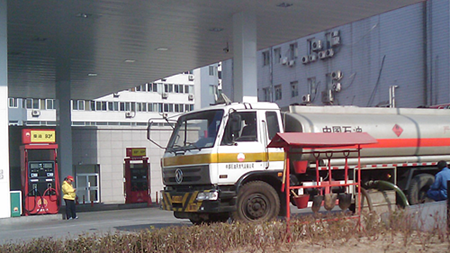
It's March 1 and spring is in the air (or is that just coal smoke?). One of the surprises for me about Beijing was how cold it really gets, especially since Beijing and San Francisco are roughly at the same latitude. Unlike in SF (or even Seattle), in Beijing, the lakes and rivers freeze over, and Beijingers head out onto the ice.
One popular place to play is Houhai, the lakes behind the Forbidden City. In addition to ice skating, the locals have other ways to enjoy the ice. One popular older form is to sit on ice chairs and propel themselves with sharp poles. According to our driver, they did this originally because many people couldn't afford skates.
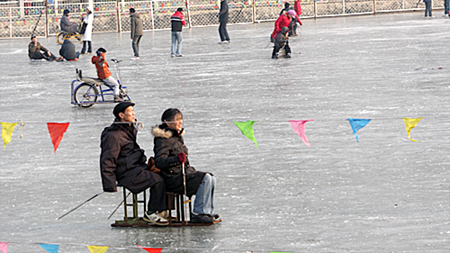
A newer toy is the ice bike. I think the back wheel must have studs on it.
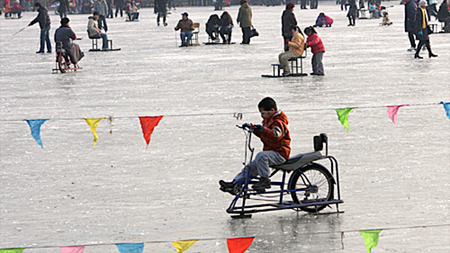
Nearby, vendors sold animals (usually ones from the Chinese zodiac) blown from blobs of sugary dough. (The art is called nie1 mian4 捏面 in Chinese, meaning "knead or pinch dough".) These were super cool, but they kind of sagged and melted when brought into the warm house. I've seen some people eat these, but I don't think that's advisable since the dude worked the dough with his hands and then blew into it the blob.
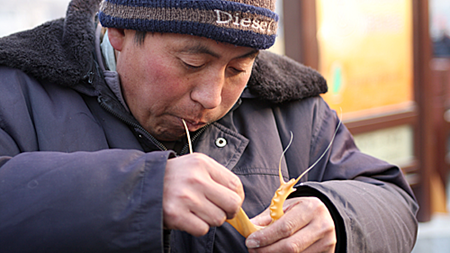
It was definitely a popular place and, like all fun things in Beijing, crowded. (The big tower in behind the lake is the Gulou or Drum Tower.)
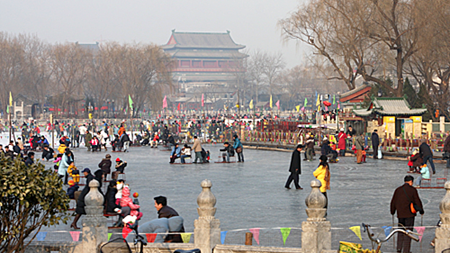
We weren't dressed to play that day at Houhai, so I took the boys skating at a rink near our house. Well, Andrew (11) skated and Michael (8) ran around on the ice.
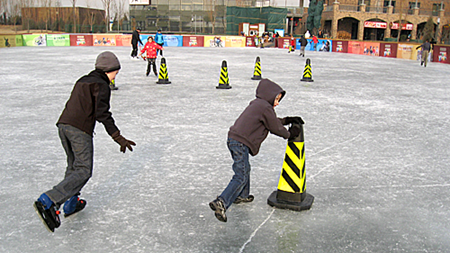
Eventually, Andrew dropped his skates and started ice bowling (with himself as the ball).
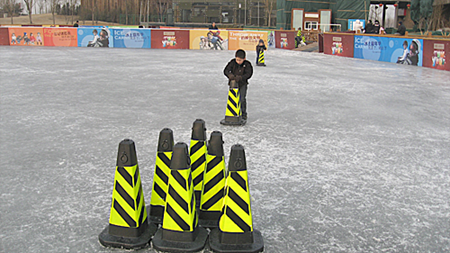
I can't remember the last time I skated or even walked on a frozen lake. It's definitely been 25-30 years (crap, I hate the way that sounds). Skating on the bumpy, grooved ice is definitely a different experience than smooth arena ice (go, Zamboni!) but we all had a great time.
While I'm looking forward to spring, I'm sad we didn't enjoy the ice more while we had it. We'll have to play more next winter.